Book 2 Unit 4 Language Points1
- 格式:ppt
- 大小:1.38 MB
- 文档页数:60


Section_ⅣLesson_2_&_Lesson_3_—_Language_Points 一、这样记单词1.(教材P24)He led the 1911 revolution and founde d the first republic of China.他领导了1911年革命,并成立了第一个中华民国。
found vt.建立,创立,创办创建于20世纪初期的这所学校一直激励着孩子们对于艺术的热爱。
②As we all know, a good relationship has to be founded on/upon trust.众所周知,良好的关系必须建立在信任的基础上。
2.(教材P25)His first victory was to win the equal rights for blacks to sit on buses. 他的第一次胜利是为黑人赢得了坐公交车的平等权。
equal(1)adj.平等的;相等的;胜任的妇女要求同工同酬。
②No one is equal to him in courage, about which every one knows.在勇气方面没有人比得上他,这一点大家都清楚。
③I even don’t know a pound is roughly equal to 500 grams, so I’m not equal to doing (do) the job.我甚至连一磅约等于500克都不知道,所以我不能胜任做这项工作。
(2)vt.不管是容貌还是在舞艺上我们都比不上她。
(3)n.相等的事物,同等的人It is reported that he is a player without_equal.据报道他是个无与伦比的运动员。
3.(教材P24)struggle n.斗争,拼搏;努力v.挣扎;奋斗;努力struggled to lead an active life.海伦·凯勒19个月大时就变得又聋又瞎了,但她从不放弃并努力过积极的生活。
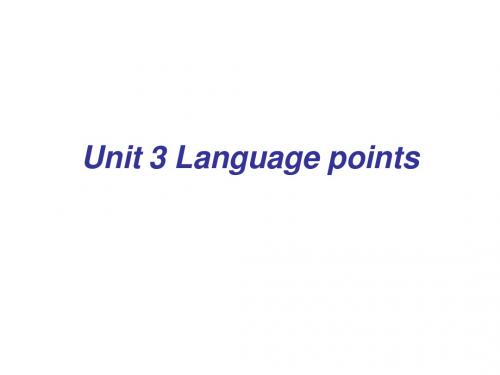

Book 2 Unit 4 Wildlife protectionPeriod 2 Language points in Warming up and Reading (I)导学目标1.熟记学案中所列出的单词和短语: decrease, die out, hunt, in danger of, relief2.通过对这些词汇的理解能够更深层次地理解课文,同时会用这些词汇造句自主合作学习v t.& vi.减少;(使)变小;或变少 n.减少,减小,their numbers may decrease.(P25)如果它们的栖息地受到威胁或是它们找不到足够的食物,它们的数量就会减少。
They are making every effort to decrease the production cost.他们正尽力降低生产成本。
年出生率正在下降。
减少到/了…… a decrease in...在…方面减少了decrease from...to...从…减少到…increase vi. & vt. 增加;增长;增强n.增加;增加的数量increase to/by ...增加到/了…… on the decrease/increase 在减少/增加小麦价格降低了15%。
介词填空②The club members decreased ______________ two hundred compared with last year.③The housing price is hoped to decrease ___________ 10% this year.④To our delight, varieties of birds in the forest are ____________ the increase.结果濒危动物甚至可能要灭绝。
This kind of bird is dying out. 这种鸟即将灭绝。
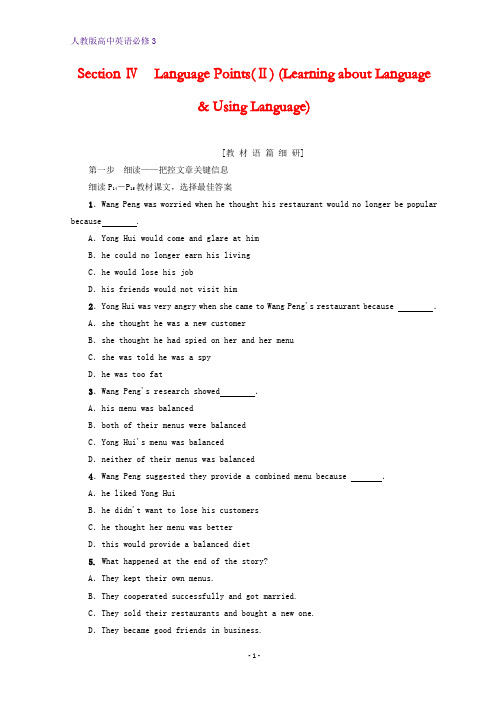
Section ⅣLanguage Points(Ⅱ) (Learning about Language& Using Language)[教材语篇细研]第一步细读——把控文章关键信息细读P14-P15教材课文,选择最佳答案1.Wang Peng was worried when he thought his restaurant would no longer be popular because .A.Yong Hui would come and glare at himB.he could no longer earn his livingC.he would lose his jobD.his friends would not visit him2.Yong Hui was very angry when she came to Wang Peng's restaurant because .A.she thought he was a new customerB.she thought he had spied on her and her menuC.she was told he was a spyD.he was too fat3.Wang Peng's research showed .A.his menu was balancedB.both of their menus were balancedC.Yong Hui's menu was balancedD.neither of their menus was balanced4.Wang Peng suggested they provide a combined menu because .A.he liked Yong HuiB.he didn't want to lose his customersC.he thought her menu was betterD.this would provide a balanced diet5. What happened at the end of the story?A.They kept their own menus.B.They cooperated successfully and got married.C.They sold their restaurants and bought a new one.D.They became good friends in business.【答案】1-5 BBDDB第二步精读——能力升华接轨高考根据P14-15教材课文,在空白处填入1个适当的单词或括号内单词的正确形式To his joy,people began coming to his restaurant again.He was able 1.to earn(earn) his living now.He didn't look forward to being 2.in debt.Then all of 3.a sudden Yong Hui walked in with 4.anger(angry).Wang Peng asked her to try a meal of his.Although enjoying the dumplings 5.served(serve) there,Yong Hui looked ill and felt sick with the fatty pork and all those heavy food.They chatted about offering a 6.balanced(balance) diet and providing a balanced menu to cut 7.down the fat and increase the fibre in the meal.They learned from each other.Before long Yong Hui put on more weight and Wang Peng became 8.slimmer(slim).9.In the end they decided to turn the two restaurants into a big one.They got 10.married(marry) and lived happily ever after![语言基础自测]Ⅰ.单词拼写根据汉语或首字母提示,写出下列单词1.There was no hope,so he sighed (叹气) with sadness.2.When will you pay off all the debts(债务)?3.We set a time limit(限定) of thirty minutes for the test.4.As students we should combine book knowledge with practice.5.The new law gains the support of farmers,who will benefit from the new law.6.You can consult a doctor about health problems.Ⅱ.拓展词汇根据词性和汉语提示,写出下列单词1.poison n.毒药;毒物→poisonous adj.有毒的2.limit vt.& n.限制;界限→limited adj.有限的→limitless adj.无限的3.benefit n.利益;好处vt.&vi.有益于;受益→beneficial adj.有益的;有好处的4.combine vt.&vi.使联合或结合→combination n.联合;结合5.cooperate vi.合作;协作→cooperation n.合作;协作Ⅲ.补全短语根据提示补全下列短语1.earn one's living谋生2.in debt欠债3.cut down削减,删节4.before long不久以后5.put on weight增加体重Ⅳ.选词填空选用上述短语的适当形式填空1.He earns his living by selling vegetables.2.Don't drink too much beer,or you will put on weight.3.You must cut down on sugar to lose weight.4.Wasteful people usually end up in debt.Ⅴ.经典句式仿写1.I don't want to upset you,but I found your menu so limited that I stopped worrying and started advertising the benefits of my food.我并不想让你心烦,不过我发现你的菜谱上的菜太有限了,所以我也就不担心了,我也开始宣传我的食物的好处了。
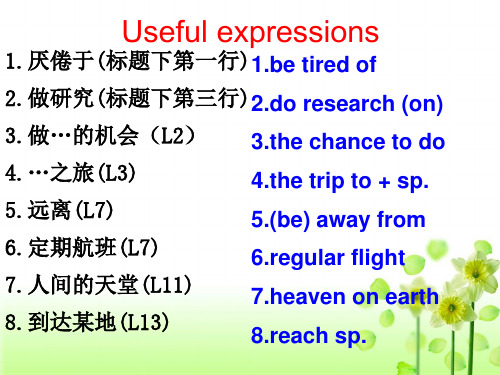
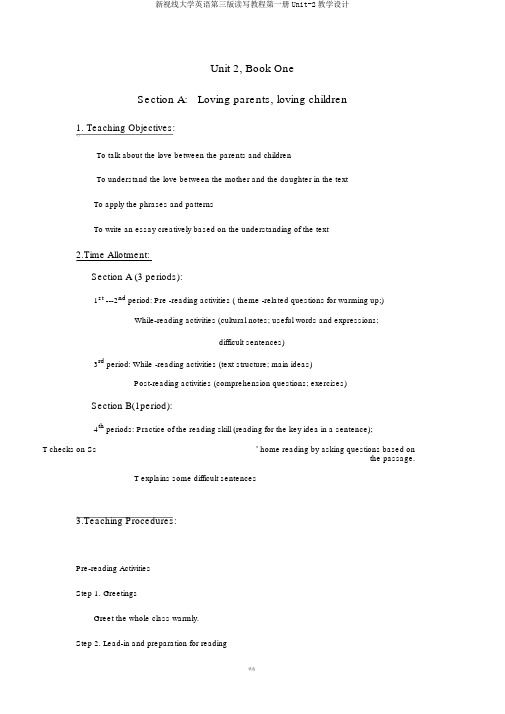
Unit 2, Book OneSection A: Loving parents, loving children1. Teaching Objectives:To talk about the love between the parents and childrenTo understand the love between the mother and the daughter in the textTo apply the phrases and patternsTo write an essay creatively based on the understanding of the text2.Time Allotment:Section A (3 periods):1st ---2nd period: Pre -reading activities ( theme -related questions for warming up;)While-reading activities (cultural notes; useful words and expressions;difficult sentences)3rd period: While -reading activities (text structure; main ideas)Post-reading activities (comprehension questions; exercises)Section B(1period):4th periods: Practice of the reading skill (reading for the key idea in a sentence);T checks on Ss’ home reading by asking questions based onthe passage.T explains some difficult sentences3.Teaching Procedures:Pre-reading ActivitiesStep 1. GreetingsGreet the whole class warmly.Step 2. Lead-in and preparation for readingLet them have a surveySurvey: How close are you and your parents?Check ( √ ) the statements which are true for you.I have been missing my parents a lot since I left for college.I often chat with my parents.I like sharing my joys and sorrows with my parents.I always remember my parents’birthdays.I know about my parents’hobbies.My parents allow me to make my own decisions.Ask a question: To what extent are you close to your parents?be like friends;never keep secret from them;ask them for advice;give me directions about lifeStep 3. Fast readingAsk the Students to read the passage as quickly as they can and then answer the questions on the screen. Let them get the main idea of each paragraph and make clear about the text structure.Text structure: ( structured writing ) The passage can be divided into 3 parts.Part1 (para.1-4) Opening part of the welcome speech General situation & my responses.Part 2 (para.5-12) The mess left in my daughter’s bathroom and my responses.Part 3 (Para.13-22) Concluding part: The changes of my attitude.Purpose: Improve the students’reading and writing ability and understand the general idea of each paragraph.Method: Read the text individually and talk in groups; Use task-based language teachingmethod, reading approach, communicative approach and total physical response method.Step 4. Preparation for details of the text on the screenStudents are required to look at the Words and Phrases on the screen and give a brief presentation in class.Words and Phrases:Purpose: Train the Students’ ability of understanding and using foreign language.Method: Talk in groups, Use task-based language teaching method , communicative approach and total physical response method.1.(Para.1) make it. 成功;准时抵达With blood pouring from his leg, he made it to a nearby house.他腿上流着血,支撑着走到邻近的一所房屋。
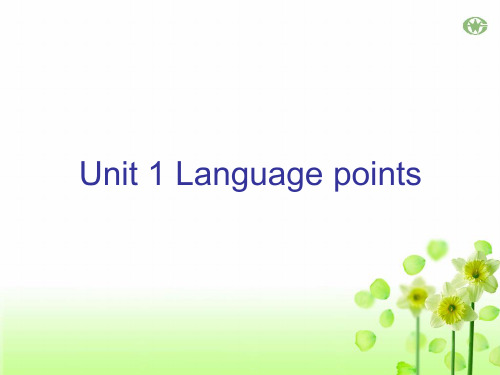

Language points in Book 4Unit 2spot (v.)notice, catch sight of 发现;看见comb (v.)to search sth carefully in order to find sb/sth 彻底搜查suspicious (adj.)not willing or able to trust sb./sth 怀疑的;多疑的impoverished (adj.)very poor; without money 穷困的;贫穷的scheme (n.)sb’s plan for achieving sth, esp.sth that will bring them some benefit 计划;诡计lucrative (adj.)profitable; making a large profit 有利可图的;获利丰厚的out ofused to show the reason why sth is done 因为;出于tuck sth awayto hide sth somewhere or keep it in a safe placeinterfere with sthto prevent sth from succeeding or from being done 妨碍;干扰divide sth (up) into sthto separate or make sth separate into partscope with sthto deal successfully with sth difficultgo about sth/doing sthto start working on sth 着手做…; 从事…kick sb out (of sth)to force sb to leave or go away from somewhere 赶走;逐出in the worldon earth 究竟;到底press sth. on/upon sbto try to make sb accept sth, although they may not want itadd up toto make a total amount of sth 总共是;总计为all in allwhen everything is considered 从各方面考虑;总的来说Unit 3punctuality (n.)the quality or habit of adhering to an appointed time准时;守时neurotic (adj.)unreasonably anxious or afraid 神经质的;神经过敏的extrapolate (v.)obtain a conclusion, make an inference 预测;推测unwarranted (adj.)not reasonable or necessary; not appropriate不合理的;不必要的;无正当理由的credence (n.)belief in sth as true 信任;相信exonerate (v.)to officially state that sb is not responsible for sth that they have been blamed for宣布(某人)无罪;免除责任stagger (v.)t o arrange people’s working hours, holidays, etc. so that they do not all begin and end at the same time 使错开;交错安排discard (v.)to get rid of sth that you no longer need 丢弃;抛弃a matter ofa situation that involves sth or depends on sth 关于…的事情be tolerant about/of/towards sthable to accept what other people say or do even if you don’t agree with it 对…忍受的;容忍的;宽容的give credence to sthbelieve sth (is true)take …for grantedto be so used to sb/sth that you don’t show that you are grateful 认为…理所当然;不把…当回事be guilty of sth(1)having done sth illegal 有罪的;犯…罪的(2)feeling ashamed of sth 感到内疚的;感到惭愧的once in a blue moonvery rarely 极为罕见;千载难逢Unit 4thrill (n.)a strong feeling of excitement or pleasure 兴奋;激动entice (v.)to persuade sb/sth to go somewhere or to do sth, usually by offering them sth 诱使;引诱depart (v.)to leave a place, esp. to start a trip 离开;离去;起程,出发assess (v.)to make a judgment about the nature or quality of sb/sth 评价;评定(性质、质量) concern (n.)sth that interests you because it is important to you 关心的事bond (n.)bond (between A and B) sth that forms a connection between people or groups, such as a feeling of friendship or shared ideas and experiences 纽带;联系;关系diminutive (adj.)(formal) very small 极小的;特小的;微小的captivating (adj.)taking all your attention; very attractive and interesting 迷人的;有魅力的;有吸引力的deprive sb/sth of sthto prevent sb from having or doing sth, esp. sth important 剥夺…;使丧失…;使不能享有capture sb’s heartto make sb. love 使…爱上;赢得某人的好感in anticipation ofanticipate…期待;预期<SYN> in prospect offigure out(1) to think about sb/sth until you understand them/it弄懂;弄清楚;弄明白(2) to calculate the amount or the cost of sth计算出(金额或成本)let sb/sth go || let go of sb/sth(1)to stop holding sb/sth 放开;松手(2)to give up an idea or an attitude, or control of sth 放弃;摒弃(想法、态度或控制) well up(of a liquid) to rise to the surface of sth and start to flow 涌出;冒出;流出;溢出Unit 5patronizing (adj.)showing that you feel better, or more intelligent than sb else 自认为高人一等的;摆派头的bestow (v.)(formal) to give sth to sb, esp. to show how much they are respected 给予;授予;献给restore (v.)to bring back a situation or feeling that existed before 恢复(某种情况或感受) pervasive (adj.)existing in all parts of a place or thing 遍布的;无处不在的uphold (v.)to support sth that is you think is right, fair, etc. and make sure that it continues to exist 支持;维护esteem (n.)great respect and admiration 尊重;敬重k eep one’s wordk eep one’s promise守信;遵守诺言fall apartgo to pieces; break up 破碎;破裂think twice (about sth/doing sth)think carefully 仔细考虑;再三考虑pave the way (for sb/sth)to create a situation in which sb will be able to do sth or sth can happen 铺路(为某人或某事创造条件)Unit 6indifferent (to sb/sth) (adj.)having or showing no interest in sb/sth 漠不关心;不感兴趣ecstasy (n.)a feeling or state of great happiness 狂喜;陶醉;入迷smother (v.)to cover sth/sb thickly or with too much of sth (用某物) 厚厚地覆盖lavish (v.)(written) to give a lot of sth, often too much to sb/sth 过分给予;滥施ubiquitous (adj.)seeming to be everywhere; very common 无所不在的;十分普遍的phenomenal (adj.)very great or impressive 了不起的;非凡的fastidious (adj.)being careful that every detail of sth is correct 一丝不苟的;严谨的elusive (adj.)difficult to find, define, or achieve 难找的;难以解释的;难以达到的attend to sb/sth(1)to deal with sb/sth 处理;对付(2)to take care of sb/sth 照料;关怀in the matter ofas to; as fa r as… is concerned 在…方面;就…而论derive from sthto come or develop from sth 起源于;来自with regard to sb/sth(formal) concerning sb/sth 关于;至于proceed with sthto continue doing sth that has already been started 继续做(或从事、进行)spring upto appear or develop quickly or suddenly 迅速出现;突然兴起part and parcel of sthan essential part of sth 重要部分;基本部分conform to(1)to agree with or match sth 相一致;相符合(2)to obey a rule, law, etc. 遵守,遵从,服从Unit 10veiled (adj.)not expressed directly or clearly 含蓄的;掩饰的assure (v.)(1)(assure sb of sth) to tell sb that sth is definitely true or definitely going to happen使…确信;向…保证(2)assure oneself (of sth)to make oneself certain about sth 弄清;查明forestall (v.)to prevent sth from happening or sb from doing sth by doing sth first 预先阻止;先发制人;在(他人)之前行动bespeak (v.)show, indicate, reveal 显示;证明monstrous (adj.)(1)shocking and unacceptable because it is morally wrong or unfair 丑恶的;道德败坏的(2)very large 巨大的exalted (adj.)(formal) full of great joy and happiness 兴奋的;兴高采烈的save (prep.)(old use or formal) except sth 除了;除…外self-assertion(n.)confidence that you have in speaking firmly about your opinions 自信;主见implore (v.)(formal) to ask sb to do sth in an anxious way because you want it or need it very much 恳求;哀求composedly (adv.)calmly, in a self-controlled manner 镇定地;沉着地be afflicted withsuffer from 受…折磨;患(病)impose sth on/upon sbto make sb accept the same opinions, wishes, etc. as your own 使(别人)接受自己的意见count for +程度词(nothing, everything, a great deal…)in face of/in the face ofwhen confronted with 面对;在…面前run riot(1)(of people) to behave in a way that is violent and/or not under control 撒野;肆意妄为(2)If your imagination, a feeling, etc. runs riot, you allow it to develop and continue,without trying to control it (指思想、情感等) 任意发挥;奔放。




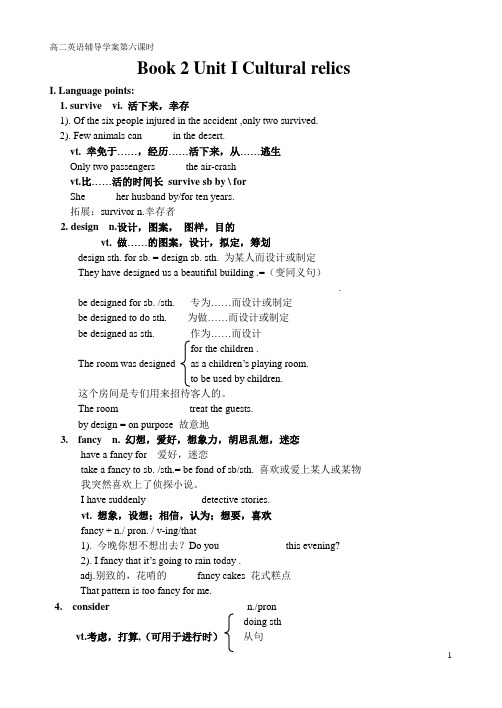
Book 2 Unit I Cultural relicsI. Language points:1. survive vi. 活下来,幸存1). Of the six people injured in the accident ,only two survived.2). Few animals can _____ in the desert.vt. 幸免于……,经历……活下来,从……逃生Only two passengers _____ the air-crashvt.比……活的时间长survive sb by \ forShe _____ her husband by/for ten years.拓展:survivor n.幸存者2. design n.设计,图案,图样,目的vt. 做……的图案,设计,拟定,筹划design sth. for sb. = design sb. sth. 为某人而设计或制定They have designed us a beautiful building .=(变同义句)___________________________________________________.be designed for sb. /sth. 专为……而设计或制定be designed to do sth. 为做……而设计或制定be designed as sth. 作为……而设计for the children .The room was designed as a children’s playing room.to be used by children.这个房间是专们用来招待客人的。
The room ____ ____ ____ treat the guests.by design = on purpose 故意地3.fancy n. 幻想,爱好,想象力,胡思乱想,迷恋have a fancy for 爱好,迷恋take a fancy to sb. /sth.= be fond of sb/sth. 喜欢或爱上某人或某物我突然喜欢上了侦探小说。

幻灯片1Language pointsUnit 4幻灯片21 begin with 从...开始2 in all directions朝四面八方3 be to do...注定做...4 solid adj.固态的5 globe n.球体6 violent adj.激烈的7 last v.持续8 explode v.爆炸9 in time 最终;及时10 atmosphere n.大气层气氛11 cool down冷却12 appear vi.出现13 unlike prep.与...不同14 fundamental adj.基本的15 harmful adj.有害的16 make it possible使它成为可能17 multiply v. 增加;繁殖18 encourage vt.促进;鼓励19 as well as 也;还20 generally adv.一般;大体21 lay eggs下蛋22 exist vi.生存;存在23 give birth to 产生;分娩24 spread vi.散布幻灯片325 thus adv.因此;于是26 in one's turn轮到某人27 prevent...from...阻止;制止28 depend on取决于29 puzzle n.谜幻灯片4However, according to a widely accepted theory, the universe began with a “Big Bang” that threw matter in all directions.1 begin with=start with“以…开始,以...为起点”.to begin with=to start with 起初;首先e.g.① To begin/start with, I didn’t like him at all.起初②—Why do you love No.9 Senior High School?—To begin with, teachers in our school are so friendly. ...= first of all 首先2 in all directions 四面八方;eg: Your classmates might be in all directions.幻灯片53 was to become3 (sth) be to (do):1. 注定要发生或必须发生They were never to meet again.2. 表示按计划、安排要发生的动作We are to meet at the school gate.3. 表命令The room is to be locked. (这个房间要上锁。

Unit Four The Virtual WorldTeaching Objectives1. Ss should grasp the main idea of text A——Despite the many negative effects of virtual life, the author prefers it to real life.2. Ss should understand the structure of the text——Contrast between virtual life and real life.3. Learn some rules of interpreting new vocabulary and usage related to computers and the Internet in English4. Grasp the key language points and grammatical structures in the text.The First Two Periods (90minutes)Part I. Review of Unit Three (10minutes)Part II. Introductory Remarks:1. Ask Ss to answer the following questions: (15minutes)1) Do you like surfing online? How long do you spend online every day?2) What do you usually do online?——checking email, chatting with friends, acquiring information, reading and watching news, watching films, purchasing, etc.3) What do you think are the advantages and disadvantages of the Internet?——advantages: Life becomes more convenient with the help of the internet.①We can communicate with relatives and friends through email, QQ, MSN despite the distance between us.②We can acquire information, news, knowledge more quickly.③we can purchase some items we need with a cheap price online without going out.——disadvantages:①Harmful information also spread rapidly. Virus spread quickly.②Some students are indulge in net-games and lots of precious time is wasted.③Cyber-love appears which is not real.④Some people conduct illegal affairs and cheating through the Internet.⑤some kind of criminals such as hackers’ crimes.2. Listen and appreciate the poem Surfing the Internet(10 minutes)You are not the only one who likes surfing the net, most of the people nowadays like logging onto the web. The following poem tells us the experience and feeling of an employee who surfs the net in his company.1) Listen and explanation of the poem2) T asks Ss the following questions:①What was the hero doing when his boss came in? (Surfing the Internet)②How did he act in front of his boss?(He pretended to be surprised at the computer which had crashed “unexpectedly”.3. Now you may guess out what we are going to talk in the unit. It’s something about the Internet. Here I’d like to share with you some Internet-related words and formation forms. (15 minutes)The following combining forms/prefixes “C yber-, virtual, Net- (net-), Web- (web), and E- (e-)”are computer and Internet related vocabulary in English.2) combining forms/prefixes + verb.Cybersurf (网络漫游), netsurf (网络漫游), websurf (网络漫游), email (发送电子邮件)3) “cyber”, “net”, etc. + suffix.cyberian (cyber+ian, 网络用户), cyberphobia (cyber+phobia, 电脑恐惧症),cybernaut (cyber+naut, 网络用户), cyberize (cyber+ize, 使联网),webify (web+fy, 使万维化), netter (net+er, 网民)4) Clipped words.Cyberdoc (cyber+doctor, 网络医生), netcast (net+broadcast,网络播放),netiquette (net+etiquette, 网规), netizen (net+citizen, 网民),netpreneur (net+entrepreneur, 网络企业家), webcam (web+camera, 网络摄像机), webliography (web+bibliography, 网络书目), webnomics (web+economics, 网络经济),webzine (web+magazine, 网络杂志), e-tailing (electronic+retailing, 电子零售),e-zine (electronic+magazine, 电子杂志).Part III. Detailed Study of Text A1. Leading in (2 minutes)As we have discussed just now, the Internet has its advantages and disadvantages. Some people think that the world Internet brings to us is not real, as the title of the Unit suggest, it’s a virtual world. Some of us like to live a life in contact with real things and real people, but others favor a virtual existence. Which life is better? I’m sure you have different opinions. Now let’s read Text A to find out what Maia Szalavitz has to say about these two life styles.2. Text Organization (15 minutes)Step one: Let students read the text quickly and try to find the answer to the following questions.1) How does the author manage her daily life?2) How does the author behave when she is suddenly confronted with real live humans?3) What does the author do to restore balance to her life?4) Does the author feel happy when she returns to the real world? Why and why not?Step two: T draws Ss’ attention to divide the text into four parts with reference to Text Organization 1 in page 107.Structure:Part 1: paras 2-3 description of the author’s virtual lifePart 2: paras1, 4-10, 13 how she feels about it after staying on the Net for a whilePart 3: para 11 what she does to return to the real worldPart4: para 12 how she feels about the real worldThe first paragraph tells about the consequences of living a virtual life and the last tells about the author’s return to it. Together, they show us the dilemma people are in: because of modern technology, we have a choice between a virtual life and real life, but we find both unsatisfactory. The author, however, finally has to choose the latter despite its negative effects.3. Cultural notes (see reference book)4. Analysis of the Text in Detaili) Analysis of Paragraph 1 (15 minutes)Step one:Ask Ss to read paragraph 1 and answer the following question:The author tells us that “after too long on the Net, even a phone call can be a shock”, How does shesupport the point in the following sentences?——My boyfriend’s accent, secretary’s clipped tone.Step two: paraphrase1) My boyfriend’s Liverpool accent suddenly becomes impossible to interpret after his easily understoodwords on screen.——After long time of reading his words on screen, it’s impossible for me to interpret his Liverpool accent all of a sudden.Attention: Adjectives followed by an infinitive active in form but passive in meaning.Adjectives like easy, hard, impossible, difficult and tough could be followed by an infinitive which is active in form but passive in meaning.(Refer to page 113, exercise III)…becomes impossible to interpret. = …becomes impossible to be interpreted.Step three: Language points1) virtual2) interpret: distinguish interpret and translate3) clipped: pronounce clearly 发音清楚的4) tone: distinguish tone (语气语调) and accent (口音)She took an angry tone with the reporters. 她带着怒气与记者说话He has an American accent. 他说话带美国口音5) rejecting: make other rejectreject: To refuse to accept, submit to, believe, or make use of.拒绝:拒绝接受,屈服,相信或使用e.g. reject an offer of help拒绝别人提供的帮助6) stretch: (cause to) become longer, wider, etc. without breakingstretch one's legs: 伸长腿; 出去遛遛stretch out a helping hand: 伸出一只援助的手stretch every nerve to do sth.: 全神贯注地做某事7) highlight: An especially significant or interesting detail or event.最重要的或最有趣的细节或事件5. Homework: preview the rest part of the text (7minutes)1) Try to summarize the author’s feeling and behavior after long time on the net.2) Find out what does the author do to restore balance to her life?The Second Two Periods (90 minutes)1. Review (10 minutes)1) Please tell us the some prefixes and combining forms related to the Internet and computer. And cite some examples.2) Translate the following sentences①My boyfriend’s Liverpool accent suddenly becomes impossible to interpret after his easily woods onscreen.显示屏上看惯了我男朋友那些一目了然的文字,他的利物浦口音一下子变得难以听懂。

新视野⼤学英语第⼆册unit4Unit 4A Test of True LoveTeaching Objectives:1.To know the meaning and usage of some important words, phrases and patterns2.To be familiar with the writing skills of the text and make use of it in writingWriting skills: A paragraph of a point of view supported by reasons.3.To improve Ss reading skills by studying Section B and passages in the Extensive Reading.Reading skills: Reading for the key idea in a sentence.4.To stimulate Ss to discuss what is of great value in love.5.To read widely outside class.Teaching Procedures:Pre-reading Activities:1. Guess Who?Describe a person in the class, and then ask your classmates to guess who he/she is.2. Discussion―You don't love a woman because she is beautiful, but she is beautiful because you love her.‖―To the world you may be one person, but to one person you may be the world.‖Do you believe in these beautiful sentences about love? What do you think of them?3.Pair-work1) What do you think very important in someone whom you will love? (For example, do you care very much about his/her appearance?)2) What kind of love do you expect in your life?Text StudyⅠ. Understand the main idea of the text. Answer the following questions after student’s preview:1. Why was John Blandford staying in Grand Central Station in New York?waiting to see a woman who …2. How did John get connected with the woman?volunteered for military service …received a book …3. How was John’s first response to the woman different from that of his friends?the onl y person to write back …4. What had the woman, Hollis Meynell, done in the past thirteen months?had faithfully written without decrease …5. How did he feel as long as he received her letters?as though, survive6. When he asked her for a photo, what did she do? Why ?decline requestSuppose she is beautiful ...Suppose she is plain ...7. Did Hollis Meynell come to the station as they had arranged?Yes, but she ...Description of a Person— Find out how Ms. Meynell looks like ...Figure long & thinHair golden & in curlsEyes blue flowersLips a gentle firmnessSuit green— Find out how the stand-in looks like ...Figure more than fatHair grayEyes fossil; grayLips pale, fatSuit brownⅡ. Brief Introduction to the text.: An army officer, who had got the strength from the letters of a never-seen woman to survive the difficult days of war, was now made subject to her special test of his love for her. He successfully stood up to the test and brought their love into a happy conclusion.Ⅲ. Structure AnalysisA.The Writing Model of Text A:1st part questions2nd part answers questions3rd part answers questions…This text is arranged by giving answers to one part after another. Now find out how each part links with the next.Part Answers Questions1 Who was that woman?What had happened between the two?2 Paras.2~3 What had happened after they fell in love ?3 Para.4 Did they meet as planned?4 Paras.5~7 Was the young woman the very one?5 Paras.8~9 How did the woman look?6 Para.10 What was he thinking then before the old lady?7 Para.11 What did the man do?8 Paras.12~13 What was the result?What did the old woman say?9 Para.14IV. ReproductionRewrite the story from Hollis Meynell's angle of view.Sample BeginningTwelve minutes to six, Hollis Meynell, a tall and thin lady in her green suit, stood at the southeast corner of the lobby in Grand Central Station, New York. It was only a twenty-stepdistance from the information desk where she was expected to ………Ⅴ. Language PointsA: Words and Expressions1. without fail: (Line 6) ① when you tell sb to do sth without fail, you are telling them that they must do it; with complete certainty 务必,⼀定② always 总是,必定I want you here by two o’clock without fail. 我要你两点钟务必来到这⾥。